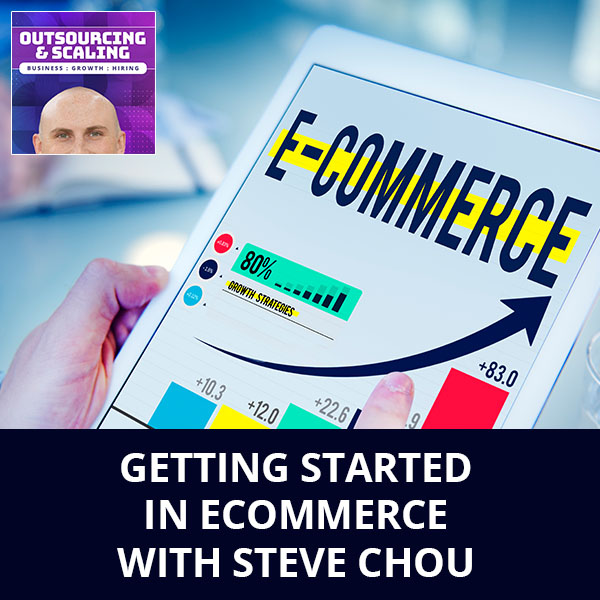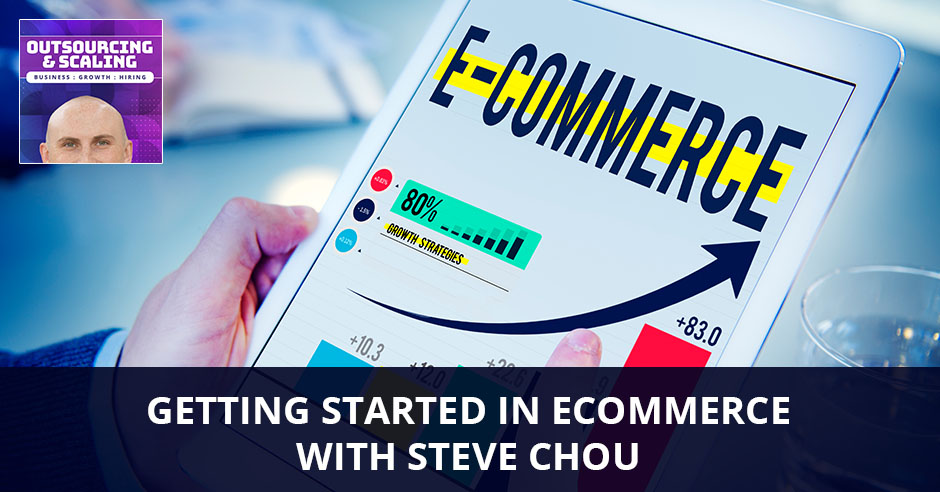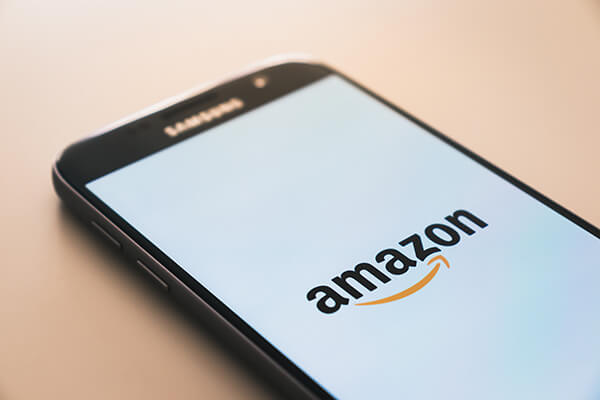


Studying to become an electrical engineer, Steve Chou didn’t have any intention to get into eCommerce or any kind of business for that matter. However, when his wife became pregnant with their first child in 2006, she wanted to quit her job. That led them to start looking at business opportunities and stumbled upon open source shopping cart. Their business soon took off with the help of Google AdWords and content marketing. Wanting to document his entrepreneurial journey, Steve got into blogging and eventually created an eCommerce training class as well as the Sellers Summit which is an annual conference dedicated to eCommerce. Steve dives into selling on Amazon and where he sees eCommerce going in 2019 and beyond, and shares some marketing tips for people considering getting into eCommerce.
—
Listen to the podcast here:
[smart_track_player url=”https://www.podetize.com/statsapi/www.podetize.com/wp-content/uploads/fileuploads/11-5b145ef137b51b3d1af0633e9305c43d/04/2019/43ec767400ba5b563b00eddead2a2181.mp3″ title=”Getting Started In eCommerce with Steve Chou” artist=”Nathan Hirsch” image=”https://freeup.net/wp-content/uploads/2019/04/OAS.png” ]
Download the audio file here.
Getting Started In eCommerce with Steve Chou
We have a very special guest, Steve Chou. How are you doing?
I’m pretty good. How are you?
I’m doing great. Steve runs a popular blog, My Wife Quit Her Job, where he teaches others how to sell physical products online. He also runs an eCommerce store with his wife called Bumblebee Linens and an eCommerce conference called the Sellers Summit and a Shark Tank-like show called The 5 Minute Pitch. Steve, that’s quite an impressive background. Why don’t we take a step back? I don’t want to go too much into your childhood, but give us a glimpse into what you were like growing up. Were you a rebel? Were you’re a straight A student? Did you know you wanted to be an entrepreneur?
I’m Asian. I went the straight-A student route. I always knew that I wanted to become an electrical engineer when I grew up. That’s what I did. I studied engineering. I actually had no intention of going to eCommerce or business at all pretty much growing up. What ended up happening was my wife, when she became pregnant with our first child, she wanted to quit her job. We live in Silicon Valley. We pretty much need two incomes to get a good house in a good school district. She told me she was going to quit and that’s when we started looking at business opportunities.
What year was that?
That was 2006.
That’s even before I got into eCommerce. What was eCommerce like back then?
It was the Wild, Wild West. I ended up using open source shopping carts that I’m still using now. There weren’t the Shopifys or the BigCommerces. They were very much in its infancy. You had to pretty much do a lot of things by hand, from scratch.
Things don’t always work out the way you thought they would.
Your wife wanted to quit her job. You got into eCommerce. Walk us through that. How did you come across it? How did you start it out? How did you learn it? Was it all self-taught?
We stumbled into it. When we got married, my wife knew she was going to cry. She was looking for handkerchiefs everywhere. We couldn’t find any in the States that she liked. Then we found this factory in China ended up importing them. We imported a bunch. We used maybe a handful of them and then we sold the rest on eBay and they ended up selling like hotcakes. That’s how we decided to start that handkerchief store when she became pregnant with our first child.
What was it like building that up? You said you sourced from China. I’m assuming there weren’t any classes like there are now saying, “This is how you source from China. These are the mistakes to avoid.”
When we first started out, we had no idea what we’re doing. We had the vendor handle everything for us for our first couple of shipments. Then it gradually got bolder and we tried different things. In terms of the website, fortunately, I have a technical background. I was able to get that up for free the shopping cart part. Stitching together all the credit card processing, all that stuff, had to be a little bit manual back then as well. It’s all self-taught. There’s some luck involved. My brother-in-law happened to be working for Google. He taught me how to do AdWords. He suggested AdWords. That’s how we got a lot of our early business. We also started a content marketing way before it was sexy. We stumbled upon it by accident. That’s how we got our initial sales.
You’re growing this business, how long before it took off? You found the supplier, you built a website and you started running Google Ads. Give us that time period.
It depends what your definition of takeoff was. Our goal for that first year was to make $60,000 in profit but we ended up doing six figures in profit, which was instantly how much my wife was making at the time. She was able to quit her job.
You’re running this business and then how long after until you launched the blog? How come you did it?
The blog didn’t happen until a year later. I got inspired to do blogging by this guy named Steve Pavlina. He wrote this post called How to Earn Your First Love Dollar. At the time all he does is write. He has only monetized via AdSense back in the day. AdSense is this ad network that Google has. He was making $4,000 a day off of AdSense. That inspired me to document my experiences.

What was the initial stage of setting up a blog? How many posts were you writing? Did you throw it together? Did you create some master plan?
No master plan at all. I spent $10 starting that thing, just a WordPress site on Bluehost. In the beginning, I was writing every single day. Then that burned me out and then gradually, it went to have three posts a day and then one post a week. I’ve maintained that one pace for the last ten years.
What was the original purpose of the blog? Did you get content out there? Did you have a goal and has that purpose changed over time?
The long-term goal was to be like Steve Pavlina. The other goal was to keep a journal of my business progress. It’s funny, things never work out the way they are. I thought my friends would be interested in this because we were all having families around the same time, but none of them read it at all. It was these random people that started finding it online and started asking me questions. That inspired me to continue writing. It also inspired me to create this training class that teaches eCommerce, which I released two years later after I started blogging.
Talk to us about this class. Is it more focused off Amazon? Is it Amazon? Is it a combination of both?
It started out as nothing to do with Amazon because back in the day, Amazon wasn’t around that timeframe. Since then, it’s evolved over time. Now it has 50% Amazon, 50% selling on your own store. The recommended flow I have now actually is to start out on Amazon, make sure that your product sells and once you know you’re going to stick with it, then create a store around those products.
You started your story, you started the blog, you start teaching other students. How did the conference, Sellers Summit, come to be? I imagine that’s a big endeavor starting off a big conference.
I had no intention of starting a conference. I had no intention of starting that training class. It was basically based on demand. People want to meet each other, people wanted to get together. People were asking me to throw some event. I knew nothing about events but fortunately at an event I met my partner, Toni Anderson. She had been running events for seven or eight years. We had this pact. She told me, “You get the speakers, you sell the tickets, you get the sponsors and I will handle all the conference stuff. You just need to show up.” That was enough for me to get the whole conference thing a try. Fortunately, it was successful but it is quite nerve-wracking.
If your product becomes super popular, it’s going to be ripe for knockoffs.
Conferences are hard and risky. It’s a lot of time and money. What did you learn in those first few years? Maybe someone out there is thinking of starting their own conference. What should they know?
The best way to do it is to start out small because you are putting your money up front and you have to fill those hotel rooms. Otherwise, you’re up for the bill. What I would do is I would email your list and see how much interest there is and create a sub-list to people who are interested in it. Then try to pre-sale tickets. Based on how many tickets you can sell, then create the size of your event according to your pre-sale quota. That’s the safest way to do it. I did not do it that way however but that’s how I would do it again if I were to start all over.
You’ve got a lot of stuff going on. How do you divide up your time in 2019? What are you most focused on?
To be honest with you, I assume you’re asking about business. I’m most focused on my kids. Outside of the kids, I’ve been focusing more on projects that I enjoyed doing. I don’t spend that much money. I’m quite frugal. The amount of money that I make across the eCommerce store or the blog, the conference and all that stuff is more than enough to make a living. That’s how The 5 Minute Pitch came about. I was hanging out with my buddies, Greg Mercer, Scott Voelker and Mike Jackness, late at night at the Sellers Summit. We were like, “We should do a Shark Tank show. Do you want to do a Shark Tank show?” “Sure.” We decided to do the show and it’s been a whole lot of fun. This is a project that makes $0. It’s a good amount of time but it’s a fun project.
You’re living more of that lifestyle business where you get to spend more time with your friends, your family. You have these businesses that are somewhat running on autopilot. How big is your team? This is outdoors. Take me behind the scenes.
What’s funny about this is I am the wrong guy for you to have on your podcast, but to run the blog, I have one VA in the Philippines to help me with that. For the event, I have Toni and then we have two other people that we hired to handle the day stuff and the planning. For eCommerce, we have four employees. Those are physical employees. They go into the warehouse, pack and ship orders. Then our Filipino VA helps out with that business as well.
You’re the perfect person for the show because it shows so many different ways that you can run a business. You’ve got people out there that are trying to build their empire and every time they get a free hour, they’re investing it back in their business. There are people that are frugal saying, “I’m making enough money. My time is the asset and I want to invest that time into projects I like and my friends and my family.” Tell us more about eCommerce in 2019. I started 2008, it was the Wild, Wild West. People started to burst on the scene. You had big players coming in and now everyone has a course and they’re teaching and everyone wants to get involved. Where do you see eCommerce going in 2019 and beyond?
I’ve always preached having your own website, having your own brand and building your own audience. A lot of these courses out there, they’re preaching like, “Sell on Amazon.” Amazon has been doing a lot of dirty things lately. For example, a number of my friends, when they’re advertising on Amazon, they have a listing. Right in the buy box is an ad for Amazon’s branded product at a third of the price or half the price of what they’re selling. Amazon is leveraging its private label products and their power on the platform to steal business away from third-party sellers. Amazon’s been changing up the rules. There are lots of Asian sellers on there doing knock offs. One of my buddies, Kevin Williams, he had his product knocked off and he spent over $1 million fighting it to get these knockoffs off. Unless you have some mindshare or your audience, you can make money in the beginning. Don’t get me wrong. If your product becomes super popular, it’s going to be ripe for knockoffs. Unless you have that strong brand, unless you have your own audience, unless you have customer loyalty, then in the long run at least your margins are going to erode.

Let’s talk about marketing too because you said, “I recommend having your own website,” and I consider you a marketing expert as much as I consider you an eCommerce. If you can’t market nowadays, I feel like we’re missing that whole bubble. You’re 100% relying on Amazon. How do you see marketing changing and are there any marketing tips for people in the audience?
The thing about Amazon is Amazon does the marketing for you. They have this huge built-in audience but unfortunately also beholden to them as well. In the long run, it takes a customer between four to eight touch points to get to know you. What you need to be doing is you need to have a way to bring people back over and over again until they are ready to buy. Whether that be through email, Facebook Messenger, push notifications or whatever, you need their contact info so you can bring them back. That’s probably one of the fundamental things that you need to do in marketing now.
Steve, we appreciate you coming on. I’d love to hear more about where people can find you, more about the Sellers Summit, what you’re excited about there and get people to buy some tickets. I know I’ll be there. I’m excited about it. It’s my first one. Tell us about it.
We’ve been sold out for the Sellers Summit. We keep that event small. It’s only about 225-ish people. Here’s the thing. We eat together, we drink together at night and everyone is there. It’s a networking-focused conference. By the end of the event, you should know almost everyone there. What’s funny is on the first day, everyone’s a little squeamish about networking but by the end of the event, everyone’s best friends patting each other on the back. That’s Sellers Summit. My Wife Quit Her Job is a blog where I talk about my experiences. I have a training class over at Profitable Online Store. If you are getting married, I can hook you up with some wedding handkerchiefs.
Thanks, Steve, for coming on.
Thanks.
Important Links:
- Steve Chou
- My Wife Quit Her Job
- Bumblebee Linens
- Sellers Summit
- The 5 Minute Pitch
- How to Earn Your First Love Dollar
- AdSense
- Bluehost
- Toni Anderson
- Profitable Online Store
About Steve Chou
 Steve Chou runs a site called My Wife Quit Her Job, where he talks about the entrepreneurial story he’s gone through.
Steve Chou runs a site called My Wife Quit Her Job, where he talks about the entrepreneurial story he’s gone through.
He’s built an eCommerce business that allowed his wife to quit her job and focus on their kids.
Before that he started BumblebeeLinens.com, a site where people can buy handkerchiefs for weddings.
